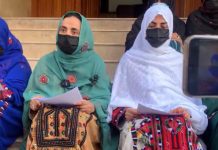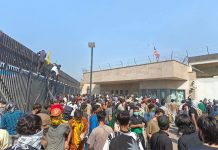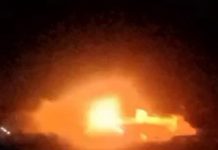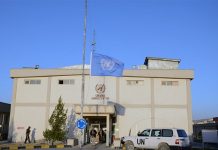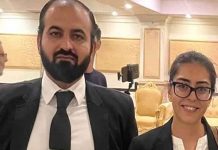On the 10th of September, a decomposed body was found in Pul-Choto area of Dalbandin city in Chaghi district. The body had resurfaced due to recent torrential rains in the area. The body was taken to Prince Fahad hospital for identification where doctors said the body was buried approximately three years ago; it contained three bullets in the chest and one in the leg.
The body was decomposed to a level that it had turned into a skeleton. The family recognized it by the shoes found in the grave, tailor’s tag on the piece of cloth, and finally the marks on the teeth. The person was identified as Hafeez Ullah S/O Raheem Muhammad Baloch who according to a 2018 press conference by his younger brother Naimat Ullah, was taken into custody by Pakistani forces on 30 August in 2016.
However, during a protest in front of Quetta Press Club, Bibi Shaari, the mother of Hafeez Ullah revealed that they were asked for a ransom of 7 million rupees by an army Major for the release of her son; and named him as Major Naveed. She further revealed that he did not let her son go even after paying the ransom money.
This led to an internal inquiry in the Pakistan army and the army Major was court-martialed. During the Field General Court Martial, he was sentenced to life imprisonment for abuse of power. A statement issued by the Pakistan Army’s media wing, ISPR in August 2019, stated that Army Chief General Qamar Javed Bajwa had upheld the Field General Court Martial’s sentence. Nonetheless, the abductee was still killed and buried secretly without informing the family.
The national media of Pakistan has kept mum on the issue and is hesitating to call out Pakistan army to explain the details of this gruesome crime in media and answer the vital questions. If Major Naveed was convicted what crime was proved on him? Was he only court-martialed for abducting a citizen for ransom or military was aware of the death of the abductee and deliberately kept it hidden from the family as well the public.
Pakistan army has been accused of committing war crimes in Balochistan by international campaign groups time and again, but no civilian institution could fix the responsibility of enforced disappearances on the army. Pakistan’s civil government established Commission on Inquiry of Enforced Disappearances (COIED) in 2011 to track the whereabouts of the victims of enforced disappearances and trace the organizations or individuals responsible for these disappearances.
Interestingly, 4642 cases out of these 6752 have been “disposed of” by the commission since 2011, whereas the 2110 cases are still pending. And the commission has also failed to fix the responsibility to date on anyone. the International Commission of Jurists — a global body of 60 eminent judges and lawyers—has recommended that the COIED’s mandate not be renewed beyond Sept 14 when its tenure is due to expire; it has failed in its purpose.
Hafeez Ullah’s family looks aware of the fact that Pakistan army is not answerable to the civil government and the family themselves cannot take the culprits to the International Court of Justice, for that, they refused to pursue the case any further and for the first time in four years, they are not waiting for Hafeez Ullah, their wait is finally over.












